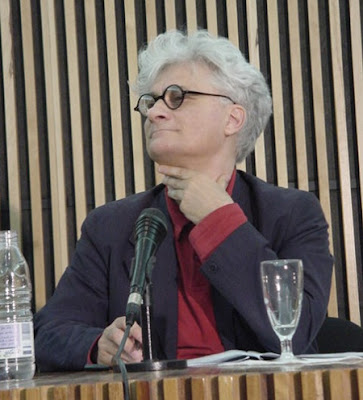domenica 28 agosto 2011
sabato 27 agosto 2011
Caucasus; just one (ethnolinguistic) map
What's missing here is of course history, natural resources, political alignments and revolutions, wars and conflicts, earthquakes (yes!), societal organizations and power hierarchies, migrations and diasporic groups (mass persecutions), planned oilpipes- and so on (victims and killers included).
[http://www.bbc.co.uk/news/world-europe-14681526
"A Chechen man has been arrested in Moscow over the murder of Yuri Budanov, the former Russian colonel jailed for a notorious murder in Chechnya", 26 August 2011]
venerdì 26 agosto 2011
La Teoria di L.A. ricaricata- stile esegesi
a. La teoria di Los Angeles è logicamente e strutturalmente connessa alla teoria di Tijuana- un po’ come il volto nascosto del pianeta delle scimmie è connesso alle scimmie trionfanti, o come la sublime, fredda e impassibile Legge è unita al suo mostruoso supplemento di nuda furia. Inoltre, Los Angeles è mostruosa la sua parte (in tutte e quattro le ‘ecologie’ descritte da Reynert Banham)- si guardi semplicemente il capitolo sul ‘noir californiano’ nel libro di Mike Davis su ‘LA CITTA’’, come la chiamò Edward Soja.
b. Si veda poi "TIJUANA 2: Michael Hemmingson's "ZONA NORTE" [2008, 215 pp]", e “TIJUANA 3/ita: JJ-180 [PK Dick, "Illusione di potere"]”- e l’approccio al suo retroterra (antropologico, non solo geografico) con ‘Imperial’: 1, 2, e a venire. Non so se questo mi proietterà nello spazio, come qualche eroe dickiano de ‘La città sostituita’ (inclusa da Vollmann nella sua monumentale bibliografia)- o semplicemente verso più casalinghi sbalzi temporali in mezzo ad alieni, come il Dr. Eric Sweetscent a Tijuana sensu stricto.
c. VALIS (Grande Sistema Vivente Intelligente Agente), la grande epica di questa porzione della superficie del globo, lo aveva mostrato: Santa Ana, California, si apre su un milione di dimensioni e un milione di soli (con molte di queste dimensioni assolutamente squallide e prive di significato- i soli neri, o grigi). ‘E molto dubbio che qui ci si possa aggrappare al principio di piacere o a quello di realtà: le cose sono un poco più complicate, la vita vera (qualunque cosa ciò significhi) non è così.
[S. Žižek, "The Matrix, or, the Two Sides of Perversion", 1999, http://lacan.com/zizek-matrix.htm]
giovedì 25 agosto 2011
IMPERIAL 4: pp 1-41/ Calexico
(long live the great technical-scientific revolution!)
[http://issuu.com/publishersoffice/docs/imperial/1?mode=a_p]
[http://issuu.com/publishersoffice/docs/imperial/1?mode=a_p]
IMPERIAL 3- whileaway
In downtown Los Angeles, early sunlight often warms the west side of the tall white canyon called Flower Street. Beneath a lush awning of tree-leaves against the scaffolded coast of the University Club, a bus blinks its red lights. The shadow of one skyscraper upon another seems as ancient as any survivor of geologic or even celestial time. But bit by bit, the shadow shrinks and thins; the yellow-tan glow takes over, brightening all the while; and Flower Street becomes busy with people and cars.
… And she spun me along Mulholland Drive, winding down across Stone Canyon and around the moist green hills with the San Fernando Valley below; white houses, the more expensive the more precious, then came dark trees and more white building-squares and mountains until the San Fernando Valley opened up, with the long straight ribbon called Sepulveda shooting through the white-and-grey-green grid toward the mountains.
In San Diego it is a cool summer day in December, palm trees whipping in the sea breeze, crisp shadows, blue sky. An American flag flies from atop an old hotel. Banana leaves wave above parking lots of littering cars. I see a billboard for Mel Gibson’s new movie “Apocalypto,” and an advertising blimp hovers over so many cars that the farthest ones are washed out by distance. The skyscrapers of San Diego’s core huddle compactly amidst the sprawl. The freeways are lush with ivy, ice plants and palm trees. This lively coast remains verdant between and among the concretions of humanity. But just outside the city we find this verdancy to be actually a human artifact; for the hills, though bushy, are semi-arid, the dirt tan or even white, showing through between grass-clumps like bald patches in a worn carpet.
LA Theory reloaded, exegesis-like
a. The LA Theory is logically and structurally connected to the theory of Tijuana- a little like the hidden face of the planet of the apes is connected with apes triumphant, or like the sublime, cold and impassionate Law is united to its monstrous supplement of naked fury. Besides, LA is monstrous its part (in all of the four 'ecologies' Reynert Banham described)- just see the chapter on 'California noir' in Mike Davis' book on THE CITY, as Edward Soja called it.
b. See later "TIJUANA 2: Michael Hemmingson's "ZONA NORTE" [2008, 215 pp]", and "TIJUANA 3: JJ-180 [Philip K. Dick , "Now wait for last year"]", with its Italian double- and the approach to its background (anthropological, not just geographical) with 'Imperial': 1, 2, and to follow. Is this going to project me into space, like some P.K. Dick hero from 'The time is out of joint' (which Vollmann puts into his monumental bibliography)-or just towards more homely time shifts in between aliens, like Dr. Eric Sweetscent in Tijuana proper?
c. VALIS (Vast Acting Living Intelligent System), the great epic of this portion of the earth surface, showed it: Santa Ana, CA, opens up into a million dimensions and a million suns (many of these dimensions being utterly drab and devoid of meaning- the suns black, or gray). It is very doubtful that here we can hold either to the pleasure or to the reality principle: things are a little more complicated, real life (whatever it means) is not like this.
[S. Žižek, "The Matrix, or, the Two Sides of Perversion", 1999, http://lacan.com/zizek-matrix.htm]
BERGAMO: Seminari sull’Antropologia e l’Epistemologia delle discipline Psichiatriche: considerazioni teoriche e prassiche
UNIVERSITÀ DEGLI STUDI DI BERGAMO
Facoltà di Scienze della Formazione
DIPARTIMENTO DI SCIENZE DELLA PERSONA
Scuola di Dottorato in Antropologia ed Epistemologia della Complessità
La psichiatria come scienza e come prassi, si genera come una specifica disciplina medica rivolta a occuparsi della sofferenza e della salute mentale. Nel corso della lunga storia della medicina occidentale, ha ricavato i suoi fondamenti epistemologici, il suo proprio spazio operativo e il suo proprio oggetto, contrastando sostanzialmente gli assolutismi tipici delle concezioni magico-religiose, nonché le riduttive e semplificate rappresentazioni organicistiche. Da sempre chiamata a interrogarsi sia sul suo statuto di scienza che di pratica terapeutica, ha talvolta ritenuto deboli i suoi fondamenti epistemologici, riconoscendoli come non adeguatamente definiti e delimitati, finendo per assumere difensivamente, visioni dogmatiche e deleterie derive ideologiche. Quando invece questa supposta debolezza è stata interpretata piuttosto che come un limite come un’occasione e un’opportunità, le discipline psichiatriche hanno potuto attingere creativamente da molteplici ambiti disciplinari e del sapere, dalla filosofia, dall’antropologia, dalla biologia, dalle neuro-scienze, dalla linguistica, dall’etologia, dall’etica e persino dall’estetica, declinandosi in questo caso come una vera e propria disciplina “complessa”, mostrando tutta la fecondità e la ricchezza che può derivare dalle connessioni dei diversi ambiti del sapere. L’idea di questo ciclo di seminari (con l’ipotesi di poter magari costituire una sorta di seminario permanente sull’antropologia e l’epistemologia delle discipline psichiatriche, con particolare attenzione alle pratiche dei Servizi di Salute Mentale), nasce proprio dal tentativo di rilanciare quest’orizzonte della complessità, sollecitare e stimolare una proficua riflessione sulle premesse teoriche attualmente prevalenti, nonché sulle ricadute che esse hanno riguardo l’organizzazione e l’operatività dei Servizi.
PROGRAMMA:
Prima giornata. 23 settembre 2011 ore 14-18:
Professor Mario Galzigna, docente di Etnopsichiatria e Psichiatria clinica, epistemologia e storia presso l’Università Ca’ Foscari di Venezia.
“Oltre il riduzionismo: per un’epistemologia della psichiatria.”
Seconda giornata. 7 ottobre 2011 ore 9-13, 30:
Professor Pietro Barbetta, docente di teorie psicodinamiche presso l’Università degli studi di Bergamo.
“La questione della diagnosi in psichiatria.”
Terza giornata. 4 novembre 2011 ore 9-13,30:
Professor Alessandro Ricci, docente di psichiatria sociale presso l’Università degli studi di Verona.
“La medicalizzazione e la psichiatrizzazione del disagio.”
Quarta giornata. 25 novembre 2011 ore 9-13,30:
Dottor Giovanni Pezzani, direttore DSM Treviglio - Dottoressa Monica Moioli.
“Il mercato delle pulci”: quale formazione per la Salute Mentale?
Quinta giornata. 16 dicembre 2011 ore 9-13,30:
Dottoressa Beatrice Catini - Dottor Maurizio Salvetti. Associazione LiberaMente, Iniziative Culturali per la Salute Mentale, Lovere (Bergamo).
“La presa in carico collettiva della Salute mentale. Un progetto per la reale inclusione sociale dei pazienti psichiatrici, una riflessione sulle buone pratiche”. Proiezione del documentario “Orizzonte del Mare”
Sesta giornata 13 gennaio 2012 ore 9-13,30:
Professor Paolo Benini, docente di Scienze della società e del Servizio sociale presso l’Università Cà Foscari di Venezia.
“Psicologia sociale e psichiatria. Quale psicologia, quale sociale e quale salute mentale: alcune riflessioni sul lavoro, le pratiche, la mission degli operatori sul Territorio; metodi, obiettivi, risultati.”
Settima giornata. 3 febbraio 2012 ore 9-13,30:
Professor Michele Capararo, docente di Psicologia delle età della vita presso l’Università Cà Foscari di Venezia.
“Riflessioni sulle attuali concezioni del Bios e le ricadute sulle discipline mediche e psichiatriche.”
Ottava giornata. 24 febbraio 2012 ore 9-13,30:
Dottoressa Andrèe Bella, Psicologa, Psicoterapeuta, Associazione Eupsichia.
“Genealogia del disturbo borderline di personalità: un tentativo di analisi della medicalizzazione delle condotte impulsive e dei problemi di autoregolazione nelle odierne ‘istituzioni del sé’ .”
Nona giornata. 9 marzo 2012 ore 9-13,30:
Dottoressa Maria Clotilde Gislon, Direttore scientifico e didattico ISERDIP Milano.
“Il modello bio-psico-sociale secondo l’interpretazione del Professor Carlo Zapparoli e la sua applicazione nei percorsi di cura dei pazienti psicotici.”
Ogni giornata, della durata di circa quattro ore, prevede l’intervento del relatore e un successivo dibattito con i partecipanti.
I seminari si terranno presso la sede dell’Università degli Studi di Bergamo, Piazza Sant’Agostino, Aula 6. Verrà rilasciato l’attestato di partecipazione.
Referenti:
Professor Pietro Barbetta Dottor Giulio De Nicola (denicolagiulio@alice.it)
SEDE UNIV. Di S.Agostino 2-24129 Bergamo
tel 035 2052 924 www.unibg.it
mercoledì 24 agosto 2011
TIJUANA 3/ita: JJ-180 [PK Dick, "Illusione di potere"]
Capitolo 14
Tijuana, di notte
Eric camminava senza meta, E strisciando i piedi. Si lasciava alle spalle, una dopo l’altra, le insegne al neon delle botteguzze strette come cabine, tendeva l’orecchio ai richiami degli spacciatori messicani di droghe, e si godeva come sempre l’incessante fluire e l’ininterrotto risuonare di clacson di vetture private e di taxi automatici. C’erano pure delle antiche auto a turbina fabbricate negli Stati Uniti e trasportate chissà come, decrepite com’erano, di qua dal confine.
— Una ragazza, signore? — Un bambino di non più di undici anni afferrò Eric per la manica e ci si appese, costringendolo a fermarsi.
— Mia sorella. Sette anni, e non è mai stata con un uomo in vita sua. Glielo giuro davanti a Dio, lei sarebbe assolutamente il primo.
— Quanto? — chiese Eric.
— Dieci dollari più il prezzo della camera: in nome di Dio, deve esserci una camera. Il marciapiede trasforma l’amore in qualcosa di sordido: lei non può mettersi a farlo qui e poi sentire ancora rispetto per sé.
— Le tue parole sono sagge — ammise Eric. Ma continuò per la sua strada.
Nelle ore notturne, per antica consuetudine, non si vedevano in giro i venditori ambulanti androidi i loro enormi e inutili tappeti e cesti intrecciati a macchina, e coi carretti pieni di involtini e pasticci di peperoni: la popolazione diurna di Tijuana scompariva insieme con i turisti americani di mezza età per lasciar posto a quella notturna.
I passanti, che camminavano più in fretta di Eric, continuavano a superarlo. Una ragazza con gonna e maglietta attillatissime lo sfiorò... come se (pensò Eric), una relazione durevole legasse le nostre vite, e questo improvviso scambio di calore attraverso un contatto corporeo rappresentasse la più profonda comunione possibile tra noi due. La ragazza passò oltre e scomparve. Alcuni ragazzotti messicani, piccoli e tozzi, che indossavano giubbotti di pelliccia aperti sul collo, puntarono direttamente verso Eric, con la bocca spalancata come se fossero sul punto di soffocare. Eric si affrettò a spostarsi, per non doversi trovare sul loro cammino.
Pensava: “In una città dove tutto è legale e nulla acquista un vero valore si è come riportati indietro nell’infanzia, collocati in mezzo ai cubetti per costruzioni e ai giocattoli, con l’intero universo a portata di mano. Il prezzo di tale evasione è alto: consiste in una rinuncia alla maturità”. E tuttavia Eric amava tale evasione. Quel rumoreggiare, quell’agitarsi significavano vita autentica. Alcuni potevano giudicare ciò malvagio, ma Eric no. Chi pensava così si sbagliava. Quelle bande di ragazzetti, per esempio, che vagavano senza sosta alla ricerca di qualcosa che essi ignoravano e che forse Dio solo sapeva: la forza che li spingeva era il genuino impulso del protoplasma primordiale. Una volta quel moto frenetico e incessante aveva condotto la vita dal mare sulla terra: divenuti ora creature di terra, continuavano ugualmente a girovagare, su per una strada e giù per l’altra. Ed Eric si mescolava in mezzo a loro.
Più avanti c’era un gabinetto di tatuaggio, moderno ed efficiente, illuminato da una parete risplendente. Il padrone, all’interno, lavorava con un ago elettrico che non perforava la pelle, ma la sfiorava incidendo un disegno a tratto continuo. Perché no?, si chiese Eric. Che cosa mi posso far tatuare? Quale motto o immagine potrebbe essermi di conforto in questo periodo così gravido di minacce, in questo momento in cui attendiamo che i lilistariani arrivino per impossessarsi della Terra? Impotenti e atterriti come siamo, diventiamo tutti quanti dei pusillanimi.
Eric entrò nel salone e si sedette. — Può scrivermi sul petto qualcosa come... — Esitò, pensando alla frase più idonea. Il padrone continuò il suo lavoro su un nerboruto soldato delle NU che teneva lo sguardo fisso nel vuoto. — Voglio un disegno — decise Eric.
— Guardi i campioni.
Eric sfogliò a casaccio l’album. C’era una donna con quattro mammelle, in ciascuna delle quali si leggeva un’intera frase. Non andava bene: Eric girò pagina. Un’astronave con lingue di fuoco che uscivano dalla coda. No: gli ricordava il suo duplicato del 2056, che egli aveva deluso. Gli venne in mente una frase: “Sto dalla
parte dei reeg”. Mi farò tatuare questa, a uso degli agenti di Lilistar. Così non dovrò prendere ulteriori decisioni.
— Si è deciso, lei? — chiese il padrone della bottega, che aveva finito col soldato.
— Voglio che mi scriva sul petto: Kathy è morta. Okay? Quanto costa?
— “Kathy è morta” — ripeté l’uomo. — Morta di cosa?
— Sindrome di Korsakow.
— Devo mettere anche questo? Kathy è morta di... come si scrive? — L’uomo prese penna e carta. — Non vorrei sbagliare.
— Dove posso trovare delle droghe da queste parti? — chiese Eric. — Droghe vere, capisce?
— Nella farmacia qui di fronte. Sono la loro specialità, amico.
Eric uscì dalla bottega e attraversò la strada, dove il traffico formava quasi un muro impenetrabile. La farmacia era arredata all’antica: nella vetrina spiccavano modelli di piedi deformi, contenitivi per ernia, bottiglie di colonia. Eric aprì la porta, che si azionava a mano, e si diresse al banco.
— Sì, signore? — disse un uomo con capelli grigi e aria professionale, che indossava un camice bianco.
Eric tese una banconota da cinquanta dollari USA. — JJ-180. Tre o quattro capsule.
— Cento dollari.
Che ladri!, pensò Eric. Aggiunse due banconote da venti e due da cinque. Il farmacista scomparve nel retro, tornando poi con una boccetta di vetro che depose davanti a Eric; quindi raccolse le banconote e le ripose nell’antiquato registratore di cassa, battendo l’importo. — Grazie — disse Eric. Prese la boccetta e uscì dalla farmacia.
Camminò più o meno a casaccio fino a quando ritrovò il Caesar Hotel. Entrò. L’impiegato sembrava lo stesso che lo aveva accolto quello stesso giorno quando era andato lì con Deg Dal Il. Questo giorno, pensò Eric, è durato anni.
— Ricorda il reeg con cui sono venuto? — chiese all’impiegato. Questi lo guardò senza rispondere.
— È ancora qui? — continuò Eric. — È vero che è stato fatto a pezzi da Corning, il sicario lilistariano di questa zona? Mi mostri la stanza. Voglio quella che ho già preso.
— Pagamento anticipato, signore.
Eric pagò e ricevette la chiave. Salì in ascensore, quindi percorse il corridoio deserto, e arrivato alla porta della stanza l’aprì e fece un passo all’interno cercando l’interruttore.
La stanza si illuminò, ed Eric vide che non c’era più alcuna traccia del reeg. La stanza era vuota, come se Deg fosse scomparso... o comunque partito. Eric riconobbe che il poveraccio aveva avuto ragione chiedendogli di essere riportato al campo di concentramento: aveva sempre saputo che la cosa sarebbe finita in quel modo.
Eric si accorse che la stanza lo riempiva di orrore. Aprì la boccetta, tolse una delle capsule di JJ-180, l’appoggiò al tavolino da toilette, e con una moneta la divise in tre parti. Ne inghiotti una, bevendo un po’ dell’acqua contenuta nella brocca; poi si affacciò alla finestra, per guardar fuori durante l’attesa.
-"droga", pp. 131-136 in Antonio Caronia e Domenico Gallo "La macchina della paranoia. Enciclopedia dickiana", AGENZIA X, 2006 CREATIVE COMMONS [http://www.agenziax.it/imgProdotti/4D.pdf]
TIJUANA 3: JJ-180 [Philip K. Dick , "Now wait for last year"]
FOURTEEN Nighttime in Tijuana.
He walked aimlessly, scuffing the pavement, passing one after another the neon signs of the narrow boothlike shops, listening to the clamor of the Mexican hucksters and enjoying as he always did the steady motion and ceaseless, nervous honking of wheels and autonomic cabs and old-time turbine surface cars made in the USA, which somehow, in their last decrepitude, had been brought across the border. 'Girl, mister?' A boy no older than eleven seized Eric by the sleeve and hung on, dragging him to a stop. 'My sister, only seven, and never lay with a man in her life; I guarantee before God, you be assuredly first.' 'How much?' Eric asked. 'Ten dollars plus the cost of the room; there must be in name of God a room. The sidewalk makes love into something sordid; you cannot do it here and respect yourself after.' 'There's wisdom in that,' Eric agreed. But he continued on anyhow. At night the robant peddlars and their enormous, useless, machine-made rugs and baskets, their carts of tamales, customarily vanished; the daytime people of Tijuana disappeared along with the middle-aged American tourists to make way for the night people. Men, hurrying, pushed past him; a girl wearing a crushingly tight skirt and sweater squeezed past him, pressing momentarily against him ... as if, he thought, we had some durable relationship penetrating our two lives and this sudden heat exchange through body contact expressed the deepest possible understanding between the two of us. The girl went on, disappeared. Small tough Mexicans, youths wearing open-throated fur shirts, strode directly at him, their mouths agape as if they were strangling. He carefully stepped from their path. In a town where everything is legal, he thought, and nothing achieves worth, you are wrenched back into childhood. Placed among your blocks and toys, with all your universe within grasp. The price for license is high: it consists of a forfeit of adulthood. And yet he loved it here. The noise and stirrings represented authentic life. Some people found all this evil; he did not. People who thought that were wrong. The restless, roving banks of males who sought God knew what- they themselves didn't know: their striving was the genuine primal under-urge of protoplasmic material itself. This irritable ceaseless motion had once carried life right out of the sea and onto land; creatures of the land now, they still roamed on, up one street and down another. And he went along with them. Ahead, a tattoo parlor, modern and efficient, lit by a wall of glowing energy, the proprietor inside with his electric needle that did not touch the skin, only brushed near it as it wove a cat's cradle of design. How about that? Eric asked himself. What could I have etched on me, what motto or picture which would give me comfort in these unusual times of duress? In times when we wait for the 'Starmen to appear and take over. Helpless and frightened, all of us become essentially unmanly. Entering the tattoo parlor, he seated himself and said, 'Can you write on my chest something like- ' He pondered. The proprietor continued with his previous customer, a beefy UN soldier who stared sightlessly ahead. 'I want a picture,' Eric decided. 'Look through the book.' Huge sample-caselike ledger passed to him; he opened at random. Woman with four breasts; each spoke a complete sentence. Not quite it; he turned the page. Rocketship with puffs belching from its tail. No. Reminded him of his 2056 self whom he had failed. I am for the reegs, he decided. Tattoo that on me so the 'Star MPs can find it. And I won't have to make further decisions. Self-pity, he thought. Or is there such a thing as self-compassion? Not much mentioned, anyhow. 'Made up your mind, buddy?' the proprietor asked him, now finished. Eric said, 'I want you to write on my chest, "Kathy is dead." Okay? How much will that cost?' '"Kathy is dead,"' the proprietor said. 'Dead of what?' 'Korsakow's syndrome.' 'You want me to put that too? Kathy is dead from - how you spell it?' The proprietor got pen and paper. 'I want it to be right.' 'Where around here,' Eric said, 'can I find drugs? You know, real drugs?' 'Across the street at the pharmacy. Their specialty, creaker.' He left the tattoo parlor, crossed against the seething, massive organism of traffic. The pharmacy looked old-fashioned, with displays of foot-ailment models and hernia belts and bottles of cologne. Eric opened the door, manually operated, and walked to the counter in the back. 'Yes sir.' A gray-haired respectable professional-looking man in a white smock, waiting on him. 'JJ-180,' Eric said. He laid a fifty-dollar US bill on the counter. 'Three or four caps.' 'One hundred US.' This was business. With no sentiment. He added two twenties and two fives. The pharmacist disappeared. When he returned he had a glass vial which he placed close to Eric; he took the bills and rang them up on his antique register. 'Thanks', Eric said. Carrying the vial, he left the pharmacy. He walked until more or less by chance he located the Caesar Hotel. Entering, he approached the desk clerk. It appeared to be the same man who had taken care of him and Deg Dal II earlier in the day. A day, Eric thought, made out of years. 'You remember the reeg I came here with?' he asked the clerk. The clerk eyed him silently. 'Is he still here?' Eric said. 'Was he really cut to bits by Corning, the 'Star hatchet man in this area? Show me the room. I want the same room.' 'Pay in advance, sir.' He paid, received the key, took the elevator to the proper floor; he walked down the dark carpeted empty hall to the door of the room, unlocked it, and stepped in, feeling for the light switch. The room lit up and he saw that there was no sign of anything; the room was simply empty. As if the reeg had gone. Stepped out, perhaps. He was right, Eric decided, when he asked me to take him back to the POW camp; he was on the right track all the time. Knew how it would end. Standing there, he realized that the room horrified him. He opened the glass vial, got out one capsule of JJ-180, laid it on the vanity table, and with a dime cut the capsule into three parts. There was water in a pitcher nearby; he swallowed one third of the capsule and then walked to the window to look out and wait.
-"droga", pp. 131-136 in Antonio Caronia e Domenico Gallo "La macchina della paranoia. Enciclopedia dickiana", AGENZIA X, 2006 CREATIVE COMMONS [http://www.agenziax.it/imgProdotti/4D.pdf]
sabato 13 agosto 2011
Franco Berardi: SCEPSI NELL'INSURREZIONE/ SCEPSI IN THE INSURRECTION
SCEPSI NELL'INSURREZIONE
Con rapidità impressionante il castello del capitalismo finanziario sta crollando, e la civiltà sociale costruita dal lavoro e dalla scienza nei secoli della modernità rischia di rimanere sotto le sue macerie. Solo l'autonomia del lavoro cognitivo potrà salvare la civiltà sociale, e questo è il compito politico, scientifico, e poetico che siamo chiamati a svolgere.
Quel che accade in questi mesi cambia definitivamente il corso delle nostre vite, e la prospettiva storica e politica in cui ci troviamo. La storia del capitalismo borghese è finita e al suo posto vediamo delinearsi una forma di dittatura finanziaria, portatrice di barbarie e di miseria.
Paradossalmente proprio il collasso dell'Unione europea riporta l'Europa al centro del mondo. Inizia un decennio di conflitto insurrezionale che si dispiegherà su tutto il territorio europeo perché questo è il luogo in cui è in gioco l'eredità dell'umanesimo dell'illuminismo e del socialismo che la dittatura finanziaria sta distruggendo.
E' grazie agli effetti della recessione occidentale che esploderà larivolta degli operai indiani e cinesi quando le merci da loro prodotte non troveranno più acquirenti nell'occidente impoverito.
Mai come ora la rivoluzione mondiale fu all'ordine del giorno. La follia volontarista del comunismo isterico novecentesco si è conclusa, come doveva, tragicamente, lasciandosi alle spalle cinismo e paralisi del pensiero. Ma il collasso d'Europa riporta il dramma della lotta fra le classi nel punto in cui Marx lo descrisse: Londra è in fiamme.
Dopo aver predicato per venti anni competizione e consumismo, gli ipocriti dicono oggi che i ribelli inglesi non hanno ideali se non fare la spesa senza pagare. Non è chiaro di quali ideali stiano parlando, ma è meglio si mettano il cuore in pace: la generazione precaria, espropriata di tutto, anche del futuro, inizia la sua
rivolta afferrando quel che le occorre senza chiedere permesso. Ma la rivolta non si ferma qui, perchè il lavoro precario è anche lavoro ad alto contenuto intellettuale. Ora insorgiamo, perchè è l'unico modo per riconquistare il nostro territorio di esistenza. Poi ricostruiremo tutto secondo scienza e coscienza. perché soltanto noi, i ribelli
precari e cognitivi, liberi dal dogma neoliberista, saremo in grado di farlo.
Un passaggio gigantesco della storia del mondo, la crisi del
capitalismo globale e l'emergere del cognitariato come classe universale, si sta svolgendo per così dire senza parole. Il pensiero fa scena muta. Assorbiti dal dogmatismo servile, e nella migliore delle ipotesi ridotti alle forme miopi del giornalismo, gli intellettuali non pensano, non sanno immaginare oltre la presente apocalisse. Ma qualcuno deve assumersi questo compito.
Per questo prima che la situazione precipitasse abbiamo costruito una scuola europea per l'immaginazione sociale.
SCEPSI è un nucleo che irradia progetti di conoscenza e di innovazione autonomi dalla catastrofe del capitalismo finanziario. Nei prossimi mesi SCEPSI sarà impegnata nell'organizzazione di seminari capaci di accompagnare immaginativamente l'insurrezione.
SCEPSI IN THE INSURRECTION
Financial capitalism is crumbling with impressive velocity, and the social civilization built by labour and science during the modern centuries, is in danger. Only cognitive work, indipendent from financial capitalism will be able to save it. Building autonomy of knwoledge from financial dictatorship is our political, scientific and poetical task.
Paradoxically Europe comes back to the center of the world stage thanks to the collapse of the European Union.
A decade of insurrectional conflict has began in Europe, because thi is the place where the legacy of five centuries of Humanism, Enlightenment and Socialism is at stakes. Indian and chinese workers will join the insurrection when the emerging capitalist economies will no more find buyers, because of the Western recession.
Therefore World Revolution is at hand as never before.
The voluntaristic folly of Lenin's communism ended tragically as it deserved, leaving behind cynicism and despair. But the collapse of Europe brings class back in the place where Marxoriginally plaaced it: London is burning.
After preaching for twenty years competition and consumerism, mass media are trying to discredit the young British rioters because they want just to shop without paying. Young people have been dispossessed of everything, future included. Now they start their rebellion plundering want they need, but this is only the beginning, as they are
also cognitive workers.
Now they are insurging, then they will build a new world from scratch,because only they can do it.
What is happening today will change the course of our lives and the historical landscape. Bourgeois capitalism is over and a financial dictatorship has taken its place, bringing destruction and misery.
Intellectuals are silent, unable to record and conceptualize the ongoing apocalypse and imagine a future. Someone has to do it. This is why we have created a European School for Social Imagination just before the apocalypse. SCEPSI will emanate projects of knowledge and innovation at the heart
of the coming insurrection.
venerdì 12 agosto 2011
from COUNTERPUNCH (CA): 'Planet of Slums, Age of Riots'
From Tottenham to Oakland
Planet of Slums, Age of Riots
By GEORGE CICCARIELLO-MAHER
Tottenham, Chile, Tunis…
There are too many to count
Oakland, Brixton, Taybat al-Imam…
We almost can’t keep the names straight.
Clichy-sous-Bois, Caracas, Los Angeles…
The phrase “riot in London” echoed strangely in my ear, prompting only muted interest. I have been present for a few riots in London and in nearby Cambridge, marches against the war and the perennial Mayday battle between anarchists and the Metropolitan Police. From these to the more recent anti-cuts marches which ended in sporadic clashes with police, my interest has gradually waned, and when I most recently heard this phrase “riot in London,” I expected it would be followed by yet another description of a ritualized protest, with some marchers “kettled” and some anarchists fighting police. This is not simply a criticism: I was not not excited, but I was certainly not excited either.
Instead, the details began to emerge: the immediate spark was the police murder of a Black man, Mark Duggan, who was shot to death by police, and the beating of a 16-year old woman demanding answers from police about Duggan’s death. The fuel for the fire had been long accumulating, however: institutionalized racism in the form of poverty, police stop-and-search methods, and more recent Conservative Party cutbacks in the name of “austerity,” this year’s chosen catchword if “revolution” doesn’t eclipse it entirely.
The similarities with other serious waves of social rebellion then began to emerge with increasing clarity. This was both about Mark Duggan and it was not (here we can agree with the British Prime Minister David Cameron, albeit toward the opposite end), just as the recent rebellions in Oakland in 2009 were both about more than Oscar Grant, just as 2008 Athens was about more than Alexandros Grigoropoulos, 1992 L.A. was about more than Rodney King, the 1965 Watts Rebellion about more than Marquette Frye, and so on. And like these previous moments, the London rebellions are spreading with a degree of spontaneity and a flexibility of organizational forms that has left police utterly confounded. There have already been more than 1,000 arrests, and as hysterical media outlets up the rhetorical ante with talk of “guerrilla warfare,” the police are gearing up for far more.
Mob Hysteria
When economic violence reaches a certain point, social counter-violence soon follows, and yet it is rarely the bankers or the politicians, the purveyors of global austerity measures, who bear the brunt. It begins with name-calling, and no name has more political and historical resonance than “the mob,” the most traditional of slurs. From Philadelphia to London, we are told, the specter of the mob looms, and to the image of the “baying mob,” that keystone of journalistic integrity The Sun has also added the image of the “trouble-making rabble.”
Irrational, uncontrollable, impermeable to logic and unpredictable in its movements, these undesirables have once again ruined the party for everyone, as they have done from Paris 1789 to Caracas 1989. In Fanon’s inimitable words: “the masses, without waiting for the chairs to be placed around the negotiating table, take matters into their own hands and start burning…”
To use the word “mob” is a fundamentally political gesture. It is an effort by governing elites and conservative forces to delegitimize and denigrate popular resistance, to empty it of all political content by drawing a line of rationality in the sand. To make demands is reasonable, but since “the mob” is the embodiment of unreason, it cannot possibly make demands. Never mind the very clearly political motivations that sparked the rebellions around London, as well as the growing and equally political concerns about economic inequality and racist policing: these have been well documented, no matter how little many Britons want to hear it.
But I want to address directly the idea that the riots are fundamentally irrational, as the smear of “the mob” would symbolically insist. Let’s listen closely, let’s block out the torrent of media denunciation and hear what the rebels are saying themselves:
Argument 1: Nothing Else Has Worked, This Might.
When ITV asked one young rebel what, if anything, rioting would achieve, his response was as matter-of-fact as it was profound:
“You wouldn’t be talking to me now if we didn’t riot, would you?... Two months ago we marched to Scotland Yard, more than 2,000 of us, all blacks, and it was peaceful and calm and you know what? Not a word in the press. Last night a bit of rioting and looting and look around you.”
As another put it: “you can’t do nothing that’s normal for it to happen right.” In other words, legitimate discontent has not been heard through official channels, and so those suffering turn to unofficial ones. If someone has an effective counter-argument to this, I’m all ears. This is not to suggest that the rebellions have a singular logic shared by every participant, but that there is logic to be found nonetheless.
This isn’t the only time riots have worked, either: in 2009 Oakland, it was riots and only riots that led to the arrest, prosecution, and conviction of BART police officer Johannes Mehserle for the death of Oscar Grant. And this effectiveness extends to the tactical, while the left marches and is surrounded by police, these street rebels have proven far less susceptible to tactics like “kettling”: as The Guardian put it,
'roaming groups of youths cannot be effectively kettled. And unlike activists they will often return to the site of trouble, seeking direct confrontation with police.The looters appear to have been more savvy. Large groups targeting shops have been melting into a nearby estate in seconds at the first sound of sirens arriving.'
Argument 2: The Rich Can Do It, Why Can’t We?
Poor people aren’t stupid enough not to have noticed what’s been going on in the world around them. As capitalist crisis has set in a massive redistribution of wealth has taken place, with banks and investors bailed out at the expense of the population, effectively rewarding them for predatory behavior and leveraging national debt into economic growth. The rich line their profits as essential services and benefits are slashed, and faced with such obvious “looting,” we are somehow expected not to notice.
One onlooker to the London riots puts it precisely:
'This is about youth not having a future… a lot of these people are unemployed, a lot of these people have their youth center closed down for years, and they’re basically seeing the normal things: the bankers getting away with what they’re getting away with… this is the youth actually saying to themselves, guess what? These people can get away with that, then how come we can’t tell people what we feel?'
As one young female looter told The Sun, “We’re getting our taxes back,” and as another told The Guardian, “The politicians say that we loot and rob, they are the original gangsters.”
Argument 3: Locating the Riots.
Essential to the imagery of the irrational mob is the insistence that the bulk of the destruction is centered on working-class communities, and here the logic is fundamentally colonial. The poor and the Blacks can’t be trusted: look what they do to their own. Incapable of governing themselves, they must be taught civilization, by blows if necessary. Here again Oakland resonates, as after the riots there a solitary African braid shop, one of many whose windows were smashed, became the media symbol of the ‘irrationality’ of rioters hell-bent on destruction and nothing more. It is worth noting that the poor rarely “own” anything at all, even in their “own” communities.
To break this narrative, we must read the actions of the rebels as well as listening to their words. While working-class communities have indeed suffered damage (we should note that working-class communities always bear the brunt of upheaval), there has been less talk of more overtly political targeting: police stations burned to the ground, criminal courts windows smashed by those who had passed through them, and the tacitly political nature of youth streaming into neighboring areas to target luxury and chain stores. On just the first night, rioters in Tottenham Hale targeted “Boots, JD Sports, O2, Currys, Argos, Orange, PC World and Comet,” whereas some in nearby Wood Green ransacking the hulking HMV and H&M before bartering leisurely with their newly acquired possessions.
This tendency was seemingly lost on analysts at The Guardian, who were left scratching their heads when the riot locations did not correspond directly to the areas with the highest poverty. And it’s not just the lefty news outlets that let such details slip: Danny Kruger, ex-adviser to David Cameron observed that: “The districts that took the brunt of the rioting on Monday night were not sink estates. Enfield, Ealing, Croydon, Clapham... these places have Tory MPs, for goodness’ sake. A mob attacked the Ledbury, the best restaurant in Notting Hill.”
While refusing to denounce the rebellions, socialist thinker Alex Callinicos nevertheless suggests that such looting is “a form of do-it-yourself consumerism… reflecting the intensive commodification of desires in the neoliberal era.” This view misses the far more complex role of the commodity during a riot, which was as evident in Oakland as in Venezuela: not only is the looting of luxury consumer items far more complex than Callinicos suggests, but the argument of looting as consumerism would have a hard time explaining both the destruction of luxuries and appropriation of necessities that often ensues
Despite the ideological deployment of the specter of mob hysteria, in the words of one observer, there is “nothing mindless” about the London rebellions.
“An Insurrection of the Masses”
British media has by now largely closed ranks against the rebellion, providing a seamless tapestry of denunciation that oscillates between the violently reactionary and the comically hysterical. But this was not without first making a serious mistake, an error in judgment that pried open but the tiniest crack into which stepped a man who has since become a focal point for resistance to the media hype. Darcus Howe, nephew of the Trinidadian Marxist C.L.R. James, seems to have inherited his uncle’s acute capacity for seeing through the racist hype about “mobs” and discerning the political kernel of seemingly apolitical daily acts of resistance, of recognizing the new even amid the crumbling shell of the old.
When asked in a live BBC interview to characterize the recent outbursts, Howe spoke the following words:
'I don’t call it rioting, I call it an insurrection of the masses of the people. It is happening in Syria, it is happening in Clapham, it’s happening in Liverpool, it’s happening in Port of Spain, Trinidad, and that is the nature of the historical moment…'
When Howe refused to follow the self-generating script, one so well-known that no orders for its reading usually need be given, the flailing BBC correspondent turned first to bad logic and then to ad hominem attack. If Howe was attempting to explain the context of the rebellions he must also be condoning their effects, and wasn’t he, by the way, himself a rioter as a youth? He wasn’t, as a matter of fact, but he was certainly accused of being one: Howe was tried for affray and riot at the Old Bailey in 1971 only to be acquitted. After Howe’s later release on charges of assaulting a police officer, Linton Kwesi Johnson penned a tribute, “Man Free,” which featured the following words
Him stand up in the court like a mighty lion, him stand up in the court like a man of iron, Darcus out of jail, Shabba!
(A video of the interview recorded from a living room has spread like wildfire, with more than 2.3 million hits as I write, and the Beeb has since been forced to apologize, blaming unspecified “technical issues”).
“The Nature of the Historical Moment”
Darcus Howe is right: there is something peculiar about “the nature of the historical moment.” Maybe it began in 1989 in the South, when Venezuelans rose up against neoliberalism in the Caracazo rebellions only to be crushed in blood and fire with up to 3,000 dead. Who was the subject of that near-insurrection, that world-historical detonator which forever transformed Venezuela and unleashed all that has come since? The poor dwellers of the barrios surrounding Caracas and other Venezuelan cities, the product of decades of systematic underdevelopment and the nascent neoliberalism that had accelerated its effects. These were the residents of the slums of which our planet was soon composed, in Mike Davis’s haunting words, and without access to political power or a workplace to strike in, they had discovered the location of their political action in practice: the streets.
But as jobs have moved South, crisis has come North. Or rather, it has been here all along, in the South of the North and the North of the South, but austerity measures have begun to shift the effects of the contemporary crisis to reach a far broader demographic. In this context, critiquing the effects of riots in our historical moment is about as effective as bemoaning the existence of gravity. Those taking to the streets of London and elsewhere are the social product of capitalist restructuring in the long term and austerity measures in the short term. But a historical subject does not gain its status merely from being a product: first it must act.
Darcus Howe’s uncle, the late C.L.R. James, was straightforward in insisting that it is in such action that the new world emerges from the shell of the old, and here I only hope to note some hopeful indications of this. First and foremost is the unprecedented spirit of unity that has emerged in the streets of London and elsewhere. As The Guardian reports:
'…the rioting has been unifying a cross-section of deprived young men who identify with each other… Kast gave the example of how territorial markers which would usually delineate young people's residential areas – known as ‘endz,’ ‘bits’ and ‘gates’ – appear to have melted away. “On a normal day it wouldn’t be allowed – going in to someone else’s area… Now they can go wherever they want. They’re recognising themselves from the people they see on the TV [rioting]. This is bringing them together.”'
This sense of unity is not merely among different sets from different areas, but also extends to the unprecedented multi-ethnic demographic that has participated: poor whites, Black British, African and Afro-Caribbean immigrants, South Asians, Muslims, and Jews have all played a role. While some in the Jewish community have complained of being singled out for the participation of Hasidic Jews in the first night’s rioting in Tottenham, this should instead be read against assumptions that the crowd was only Black or only Muslim. All ages have participated as well, with entire families spotted either looting or warning looters of approaching police. The youth, and especially young men, have nevertheless constituted the functional spearhead of the rebellions, with one observer insisting that “this is a movement of the youth, of the young people saying, guess what mister, I’ve got no voice, no future, no leadership.”
But if C.L.R. James saw the potential for unity amid such rebellions, cracks in the shell of the old often produce dangerous shards, and so he was also keenly aware of the equal potential for the opposite: racist backlash among even poor whites. Thus while the more the more liberal wing of white supremacy has appeared in the form of “broom armies” cleaning up the aftermath of the rebellions (wearing t-shirts emblazoned with such heartwarming slogans as “rioters are scum”), “mobs” of white racists like the “Enfield Army” have also emerged, offering their services to the police against the rioters (this alongside the more organized white supremacy of the English Defence League).
“The Left Must Respond”
In a short web comment, Daniel Harvey expressed the sentiment of many on the radical left seeking to walk the fine line between uncritically embracing the English rebellions and falling into the right-wing media strategy of denunciation:
'We have to remain loyal to this crisis. We have to support the eruption of the unheard and the unspoken in our obscene society… the problem is not the excesses o'f this or that action, it is that the rioters are simply not radical enough. We have to radicalise them further… We have to support the anger, but make the anger political, and thereby turn it into something genuinely powerful and dangerous – a revolutionary moment rather than a riot.'
This is certainly true in one sense, but it runs the risk of neglecting the fact that “the left” is far behind the rebels in the streets. In some key ways, these riots are far more radical and more effective than the left has proven itself to be, and the rebels have certainly surpassed the left in tactical savvy as in sheer bravado. Who is really more radical?
Certainly, “the left must respond” as one op-ed puts it, if only to fight the messaging of the right, but only if we recognize that there is much we can learn from those rushing through the London streets. As one observer puts it, these youth “got nothing to lose,” to which we might be tempted to add, ‘but their chains…’
George Ciccariello-Maher is Assistant Professor of Political Science at Drexel University. He is completing a people’s history of the Bolivarian Revolution in Venezuela and beginning a history of rabbles, mobs, and gangs. He can be reached at gjcm(at)drexel.edu.
http://counterpunch.org/maher08122011.html
Iscriviti a:
Post (Atom)































